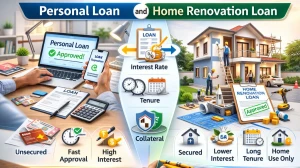
How to Get a First Time Home Owners Loan? What Qualifies as a First-time Buyer?
To acquire a first-time homebuyer loan, assess eligibility, finances, and down payment, explore programs, understand mortgage insurance, seek guidance, and complete the application process for homeownership.
Published Aug 08, 2023 | Updated Dec 27, 2023 | 📖 6 min read
How to Get a First Time Home Owners Loan?
To secure a first-time homebuyer loan, you'll first need to meet certain criteria, as outlined by the U.S. Department of Housing and Urban Development. It's important to note that being a first-time homebuyer is defined more broadly than simply never having owned a home before.
Here are the criteria to qualify as a first-time homebuyer:
No Recent Home Ownership
- You should not have owned a principal residence for the past three years.
Unique Circumstances
- If you're a single parent who only owned a home with a former spouse during marriage, a displaced homemaker who owned with a spouse, or if you've only owned a residence not permanently affixed to a foundation, you still qualify.
Building Code Compliance
- If your previous property did not comply with building codes, you're considered a first-time homebuyer.
Meeting these criteria opens the door to various loan programs tailored for first-time homebuyers. While general mortgage requirements include proof of a stable income over the past two years, a down payment of at least 3.5%, and a credit score of 620 or higher, some programs cater specifically to those with low income. Remarkably, certain initiatives even allow for home purchases with $0 down payment and credit scores as low as 500.
How Much Deposit Do You Need for a First-time Buyer?
For first-time home buyers, the deposit required typically starts at 3%, although certain loan programs may allow for a 0% down payment, subject to specific eligibility criteria. Realistically, most first-time buyers aim for a 3% down payment on a conventional loan or 3.5% for an FHA loan. So, if you're eyeing a $450,000 home, you'd need to save approximately $13,500 to $15,750 for the down payment.
Contrary to a common misconception, the average down payment for first-time home buyers is not the hefty 20% often believed. According to data from the National Association of Realtors, the average down payment for first-timers is just 6%, compared to 17% for repeat buyers. On a $450,000 home, this translates to a $27,000 down payment.
Moreover, if your credit score is around 620, you might qualify for a mortgage with as little as 3% down, meaning an out-of-pocket expense of $13,500 for that $450,000 home.
While low-down-payment options make homeownership more accessible, it's crucial to be aware of the potential additional cost of private mortgage insurance (PMI) if you don't put down 20%. Discussing these details with your mortgage advisor ensures you have a clear understanding of the financial aspects involved in your home purchase journey.
Who is Considered a First-time Homebuyer?
A first-time home buyer is broadly defined as someone who hasn't owned their home within the last three years. This category encompasses a diverse range of individuals, including renters, children, single parents, displaced homemakers, investors, and even those living rent-free. The key criterion is the absence of homeownership in the immediate three-year period leading up to the buyer's settlement date.
Comprising 45 percent of the home purchase market, first-time home buyers are eligible for special programs designed to make homeownership more affordable and attainable. Federal law and government agencies supporting first-time buyer mortgages recognize seven groups of people as qualifying for first-time home buyer status:
Renters
The purest definition of a first-time home buyer applies to those who have never owned a home before.
Homeowners returning after a gap
Individuals who owned a home in the past but haven't done so in the last three years are eligible for first-time buyer benefits upon re-entering the market.
Investment property owners
Owning an investment property doesn't disqualify someone from being a first-time home buyer. If the primary residence is rented, and there's been no ownership of the main home in the last three years, one qualifies.
Single parents re-entering the workforce
Even if a single parent previously owned a home with a former spouse, they are considered a first-time home buyer, regardless of their name being on the deed or mortgage.
Family caregivers who left the workforce
Those who left their job to care for a family member without pay may be eligible to buy a home as a first-time home buyer.
Mobile home owners
Owners of mobile homes on foundations that are not permanently attached can be classified as first-time home buyers, including those with movable or temporary homes.
Homeowners with structurally unsound homes
Individuals who owned homes that failed safety tests, where the cost of repairs exceeded the property's value, qualify as first-time home buyers. This often pertains to older or damaged properties in need of significant repairs.
Which Mortgage is Best for First Time Home Buyers?
When it comes to buying your first home, there are different types of loans to consider. Each has its own perks, from flexible terms to special benefits, designed to suit the diverse needs of first-time homebuyers. Let's explore these options in simpler terms.
Conventional Mortgage Loans
These are regular home loans that last for 15 to 30 years. If you have a decent credit score, a stable job, and can put down at least 3%, you might qualify. They're flexible and good for people who meet certain credit and money criteria.
Fixed-Rate Mortgage Loans
Fixed-rate mortgages have a steady interest rate for the whole loan, lasting from 10 to 30 years. They're good if you want predictable monthly payments and don't want to worry about changing interest rates.
Federal Housing Administration (FHA) Mortgage Loans
If you're a first-time buyer with a not-so-great credit score and can't put down a big down payment, FHA loans could be for you. They're backed by the government and make it a bit easier for you to qualify.
U.S. Department of Agriculture (USDA) Mortgage Loans
USDA mortgages are low-interest, no down payment loans designed for low-income homebuyers in rural areas. While accessible to those with poor credit, eligibility is subject to income and location criteria, making them suitable for qualifying first-time homebuyers in specific regions.
Veterans Affairs (VA) Mortgage Loans
VA loans, backed by the U.S. Department of Veterans Affairs, cater to current service members, veterans, and eligible spouses. With benefits like no down payment and competitive interest rates, VA loans are a valuable option for military-affiliated individuals entering the housing market.
How to Get a First Time Home Owners Loan - FAQ
1. What steps are involved in getting a first-time homebuyer's loan?
Acquiring a loan involves assessing your credit, setting a budget, saving for a down payment, exploring loan options, obtaining pre-approval, collaborating with a realtor, applying for a mortgage, navigating the loan process, and completing the closing.
2. What are the requirements for first-time homebuyers?
First-time homebuyers typically need a minimum two-year income record, a 3.5% down payment, and a credit score of 620.
3. What are the different programs available for first-time homebuyers?
First-time homebuyers have options like FHA, VA, USDA loans, and state-specific programs. These programs offer varied criteria and benefits to assist in homeownership.
4. How can first-time homebuyers manage financial challenges?
Initiatives like down payment assistance, tax deductions, closing cost assistance, and educational programs can help first-time buyers navigate financial challenges and enter the housing market confidently.
5. What factors do lenders consider for mortgage eligibility?
Lenders evaluate credit scores, loan-to-value ratio (LTV), debt-service coverage ratio (DSCR), income, and other financial aspects to determine a borrower's eligibility for a mortgage loan.




